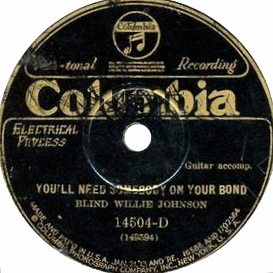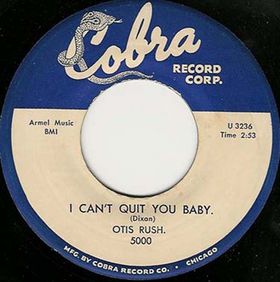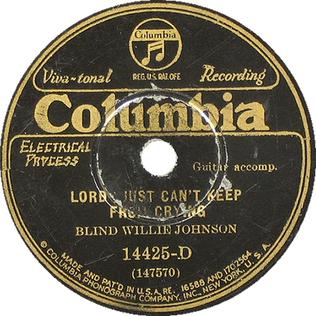
Blues is a music genre and musical form that originated amongst African-Americans in the Deep South of the United States around the 1860s. Blues has incorporated spirituals, work songs, field hollers, shouts, chants, and rhymed simple narrative ballads from the African-American culture. The blues form is ubiquitous in jazz, rhythm and blues, and rock and roll, and is characterized by the call-and-response pattern, the blues scale, and specific chord progressions, of which the twelve-bar blues is the most common. Blue notes, usually thirds, fifths or sevenths flattened in pitch, are also an essential part of the sound. Blues shuffles or walking bass reinforce the trance-like rhythm and form a repetitive effect known as the groove.

Slide guitar is a technique for playing the guitar that is often used in blues music. It involves playing a guitar while holding a hard object against the strings, creating the opportunity for glissando effects and deep vibratos that reflect characteristics of the human singing voice. It typically involves playing the guitar in the traditional position with the use of a slide fitted on one of the guitarist's fingers. The slide may be a metal or glass tube, such as the neck of a bottle, giving rise to the term bottleneck guitar to describe this type of playing. The strings are typically plucked while the slide is moved over the strings to change the pitch. The guitar may also be placed on the player's lap and played with a hand-held bar.
Country blues is one of the earliest forms of blues music. The mainly solo vocal with acoustic fingerstyle guitar accompaniment developed in the rural Southern United States in the early 20th century. It stands in contrast primarily to the urban blues style, especially in the pre-war era.

Booker T. Washington "Bukka" White was an American Delta blues guitarist and singer.

Blind Willie Johnson was an American gospel blues singer and guitarist. His landmark recordings completed between 1927 and 1930—thirty songs in total—display a combination of powerful "chest voice" singing, slide guitar skills, and originality that has influenced generations of musicians. Even though Johnson's records sold well, as a street performer and preacher, he had little wealth in his lifetime. His life was poorly documented, but over time, music historians such as Samuel Charters have uncovered more about Johnson and his five recording sessions.

"You Shook Me" is a 1962 blues song recorded by Chicago blues artist Muddy Waters. Willie Dixon wrote the lyrics and Earl Hooker provided the instrumental backing; the song features Waters' vocal in unison with Hooker's slide-guitar melody. "You Shook Me" became one of Muddy Waters' most successful early-1960s singles and has been interpreted by several blues and rock artists.

"You'll Need Somebody on Your Bond" is a gospel song that is attributed to both tradition and to gospel blues musician Blind Willie Johnson. Johnson first recorded the song in December 1930, although Delta blues musician Charley Patton recorded a similar "You're Gonna Need Somebody When You Die" in October 1929. Over the years, several other musicians have recorded renditions of the song.

"I Can't Quit You Baby" is blues song written by Willie Dixon and first recorded by Chicago blues artist Otis Rush in 1956. It is a slow twelve-bar blues ensemble piece, with lyrics about the consequences of an adulterous relationship which is difficult to end.

"Rollin' and Tumblin'" is a blues standard first recorded by American singer-guitarist Hambone Willie Newbern in 1929. Called a "great Delta blues classic", it has been interpreted by hundreds of Delta and Chicago blues artists, including well-known recordings by Muddy Waters. Rock musicians usually follow Waters' versions, with the 1960s group Cream's rendition being perhaps the best known.

"It's Nobody's Fault but Mine" or "Nobody's Fault but Mine" is a song first recorded by gospel blues artist Blind Willie Johnson in 1927. It is a solo performance with Johnson singing and playing slide guitar. The song has been interpreted and recorded by numerous musicians in a variety of styles, including Led Zeppelin on their 1976 album Presence.

"Dark Was the Night, Cold Was the Ground" is a gospel blues song written and performed by American musician Blind Willie Johnson and recorded in 1927. The song is primarily an instrumental featuring Johnson's self-taught bottleneck slide guitar and picking style accompanied by his vocalizations of humming and moaning. It has the distinction of being one of 27 samples of music included on the Voyager Golden Record, launched into space in 1977 to represent the diversity of life on Earth. The song has been highly praised and covered by numerous musicians and is featured on the soundtracks of several films.

The Soul of a Man is an album of "twenty haunting spiritual blues songs" recorded in the late 1920s and 1930 by the American gospel blues singer and guitarist Blind Willie Johnson that was released by Charly Records in 2003.
"Trouble Will Soon Be Over" is a traditional gospel blues song recorded in 1929 by Blind Willie Johnson and Willis B. Harris, who is thought to have been his first wife.

"Lord I Just Can't Keep From Crying" is a traditional gospel blues song recorded in 1928 by Blind Willie Johnson and Willis B. Harris (vocals), who is thought to have been his first wife. Some versions of the song recorded by other artists have slightly different titles: for example, a comma after "Lord"; or, "Cryin'" instead of "Crying"; or, an appended "Sometime" or "Sometimes".

The Complete Blind Willie Johnson is a compilation album of all the known recordings by American gospel blues singer-guitarist Blind Willie Johnson. As part of the Roots N' Blues series, it was released jointly by Columbia Records and Legacy Recordings, on April 27, 1993. All of the tracks on the two-compact disc set were originally issued by Columbia on the then-standard two-sided 78 rpm record format.

American Epic: The Best of Blind Willie Johnson is a compilation album released to accompany the award-winning American Epic documentary film series. It collects performances from Blind Willie Johnson's five recording sessions for Columbia Records in Dallas, Atlanta, and New Orleans between 1927 and 1930. The album was released as a 16-track download and a vinyl LP.
Can't Nobody may refer to:














